Electronic waste or E-waste includes used and/or damaged electronic and electrical equipment (EEE). Such items are discarded by consumers or companies along with rejects from repair, refurbishment, and manufacturing processes. These wastes are usually carelessly discarded along with junk items in open areas and places where trash has been accumulated. But, e-waste when not disposed off and recycled properly can cause significant damage to health and the environment.
This is where e-waste recycling companies come in and regulate the e-waste according to the E-waste management standards. E-waste like televisions, refrigerators, washing machines, computers, laptops, printers, LEDs, LCDs, and much more are not exactly hazardous wastes. Nonetheless, the hazardous components present in the can result in harmful effects when they are dismantled and processed.
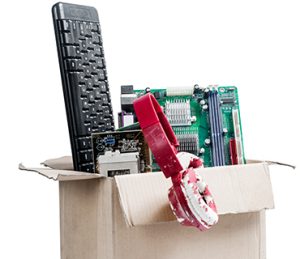
This is where we come in and use our authorized techniques and sophisticated technology to properly dispose of the e-waste and recycle the precious metals, and rare minerals. It is much more economical and safe for the environment to obtain Li-ion Batteries and other important components this way than mining them. We organize our own pickups and collection points to properly handle e-waste according to the national guidelines.
Along with Electronic Waste Recycling, we also handle Plastic Recycling to help consumers maintain sustainable environmental and resource efficiency. Plastic recycling refers to recovering and reprocessing scrap plastic into functional products. The main goal of such a process is to reduce the rising rates of plastic pollution while simultaneously putting less pressure on raw materials, which are used to make new plastic products.
As waste management agency, we take the best approach possible to conserve resources and divert plastics away from landfills, open public areas or dumping grounds like oceans. There has always been a need for recycling scrap plastic and this need just keeps growing. Plastics are extremely useful, durable, lightweight and inexpensive materials. They can be moulded into various shapes and sizes to make different products that are in turn used in a large number of applications.
Many electronics and their accessories run on batteries and one common thing they all have is that they will get exhausted one day. When they do run out, we replace them with new batteries and discard the old ones. But, disposing off batteries the same way we do with garbage can create a large portion of e-waste in the environment. They contain harmful materials which could seep into the soil causing harm to the ecosystem.
Battery recycling can be a great alternative to disposal as we can get valuable metals and minerals from them. We aim to reduce the number of batteries disposed of in landfills as solid waste. Consecutively, the soil contamination and water pollution caused by heavy metals and toxic chemicals will be significantly reduced.
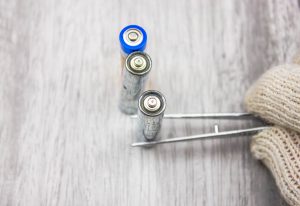
We use proper handling techniques and transport the used up batteries safely to our plants. However, unlike the other commonly used materials like paper and plastic, different batteries have different methods of recycling. They vary based on their composition and components like lead, lithium-ion (Li-ion), lithium-ion polymer, nickel-zinc, nickel-metal hydride (Ni-MH), nickel-cadmium (Ni-Cd), and alkaline.
Extended Producer Responsibility, commonly referred to as EPR is the responsibility borne by the “Producers” of electronics to organize a reverse collection mechanism. This includes recycling of EoL equipment as listed in Schedule – I of E-waste. The main objective of EPR is to achieve circular economy by bringing items like these back into the system to recover any and all usable resources embedded in the E-waste.
We have over a decade of experience in handling wastes responsibly and utilize proper methods to effectively and efficiently extract recyclable materials.
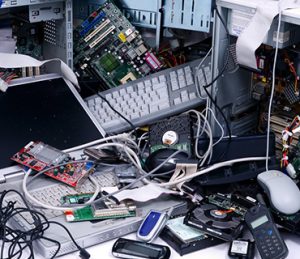
We give a helping hand to such organizations by collecting, recycling and disposing off unusable waste properly. We also conduct extensive awareness programs which include social media campaigns, corporate events and more to spread the “save the environment” message
To expand the area where cellular service is available, we constantly erect new telecom towers on sites all over the nation. However, not all the sites continue to remain operational and somewhere at some point, we need to decommission and dismantle the towers, which are no longer functioning properly or needs to be replaced. This is where we provide our telecom tower site operations service to help owners and operators determine when their tower sites need to be removed, scrapped, recycled and cleaned up.
Our experienced team members can assess the site conditions and remove the structures safely. For such large operations, proper SoP’s are followed by our teams, taking into account the technical hazards and complications involved. Moreover, the task does not just stop there as thorough cleaning of the site is required post-removal. Telecom tower site operations require specific expertise while removing complicated structures like communication towers.
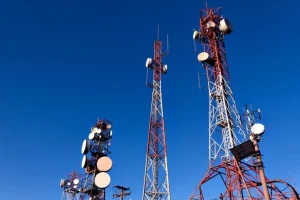
Telecom demolition includes towers, batteries, internal equipment, communication shelter removal and hazardous material. It involves a process with a number of stages to safely, effectively and efficiently recover whatever can be reused and dispose-off the rest. Our expertise are in this domain.
Security and confidentiality are two of the most important elements in companies especially the ones in the IT industry. So, when the electronics like computers and laptops are being recycled, the data needs to be wiped thoroughly to avoid misuse and important information falling into the wrong hands. We provide data destruction or data wiping services ensuring that all data is erased from tapes, hard disks and any other forms of electronic media.
Data destruction is a term often defined in a variety of ways, however, it is still different from data sanitisation and physical destruction. Nonetheless, all of these terms are involved to make sure your data is simply irrecoverably and permanently destroyed. We make sure that your data is truly gone while complying with all global standard of data erasure to protect your private information.
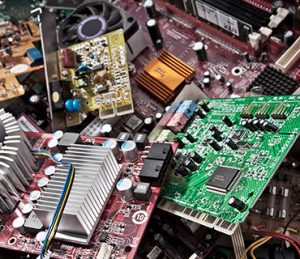
Once everything is safely wiped, we recycle the parts by breaking them into steel, aluminum, copper, etc. We destroy data ethically and by properly informing you beforehand of our procedures.
© 2023 Pythonic Waste Services PVT. LTD